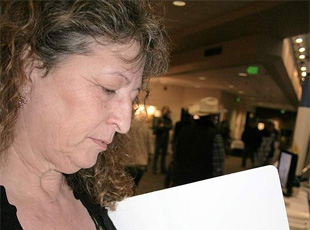Grower offers help with Global Gap
A cherry grower in Wenatchee, Wash., apparently has written the first manual from a grower’s perspective to help produce farmers meet Global Gap food safety requirements.
 A cherry grower in Wenatchee has devised a farmer-friendly manual to help fruit and vegetable growers comply with Global Gap food safety requirements.
A cherry grower in Wenatchee has devised a farmer-friendly manual to help fruit and vegetable growers comply with Global Gap food safety requirements.
Juli Ogden, who was a Realtor for 10 years prior to buying a small cherry orchard just south of Wenatchee 10 years ago, says she conducted about six workshops for growers with her manual last year and anticipates doing 25 this year. It spells out what growers need to do and when they need to do it to be Global Gap compliant.
On Feb. 27, she will present her manual, she calls “The Farm Plan,” to 25 managers and food safety staff of a large produce marketer in California and has interest of another such firm, she said.
Jonathan Needham, vice president of operations of Global Gap North America, in Baltimore, M.D., said he knows of no other independent manual like Ogden’s and called it a very helpful tool. Global Gap is looking into ways of distributing it, he said.
Ogden is one of about 10 Global Gap-licensed farm assurers in the U.S. and Canada, he said. That means she is approved to help growers prepare for Global Gap certification by independent, third-party auditors, he said.
Global Gap is the world’s leading certifier of good agricultural practices in food safety, traceability, environmental sustainability, worker heath and safety and animal welfare.
In February 2012, Ogden and other growers were told by their packing shed, McDougall & Sons Inc., Wenatchee, that they needed to comply with Global Gap food safety requirements to sell their cherries that summer and apples that fall. Retailers insisted on it.
“We had a training day and were handed a confusing 328-page binder of regulations that repeated itself, was full of strange words and was presented by a highly educated person who had no clue how to talk to a farmer,” Ogden wrote on her website. “That room held 70 irritated, threatened growers.”
McDougall was helpful, Ogden said, but there was nothing written in plain English that explained what to do.
Many of the requirements seemed “ridiculous,” she said, such as that pickers couldn’t wear nail polish or jewelry other than a simple, band-ring. Clothes had to be clean. Sweatshirts could not be hung on ladders or corners of bins. All of it was aimed at keeping fruit clean.
“Everytime a picker sneezes they are suppose to go wash their hands,” she said. “The more I studied, I could see the sense in the philosophy, but in many ways it seemed over the top.”
Birds fly over fruit inside stores and customers can sneeze and cough on fruit, she noted.
“It doesn’t make sense to have to prove we have water rights. We’re kind of treated like we’re in high school,” she said when speaking at Washington State University Extension’s North Central Washington Apple Day in Wenatchee in January. Global Gap overlaps state regulations, she said.
Ogden boiled down the 328 pages of Global Gap requirements and 269 audit questions into her own 46 pages. She included all the necessary forms, instructions on management of inventory, training of workers, record keeping of equipment calibration, pesticide application, fertilizer storage and more. Like means of proving you considered minimizing use of fuel. There’s a schedule of what to do when throughout the year.
The Farm Plan is written in what she calls “farmer” instead of legalese. She uses “dirt” instead of “substrata.”
“I’ve had this system audited twice and it’s all there,” she told the growers at Apple Day.
She said she showed it to top Global Gap officials who liked it and said they’d been trying to make their own user-friendly manual for years.
Ogden finished her manual in the spring of 2012 and revised it and began offering workshops with it in 2013 at the request of other growers. Attendees get the copyrighted manual.
It applies to all tree fruit and produce growers using Global Gap because the requirements are the same for fruit and row crops, she said.
Most of the requirements are pre-harvest. Auditors come during harvest, want proof requirements are met and want to observe and talk to workers right when growers are at their busiest and at a crucial stage of their annual income, she said.
Ogden said she wants to develop The Farm Plan as a business but ultimately wants to sell it because she would rather grow cherries.
Source: capitalpress.com


